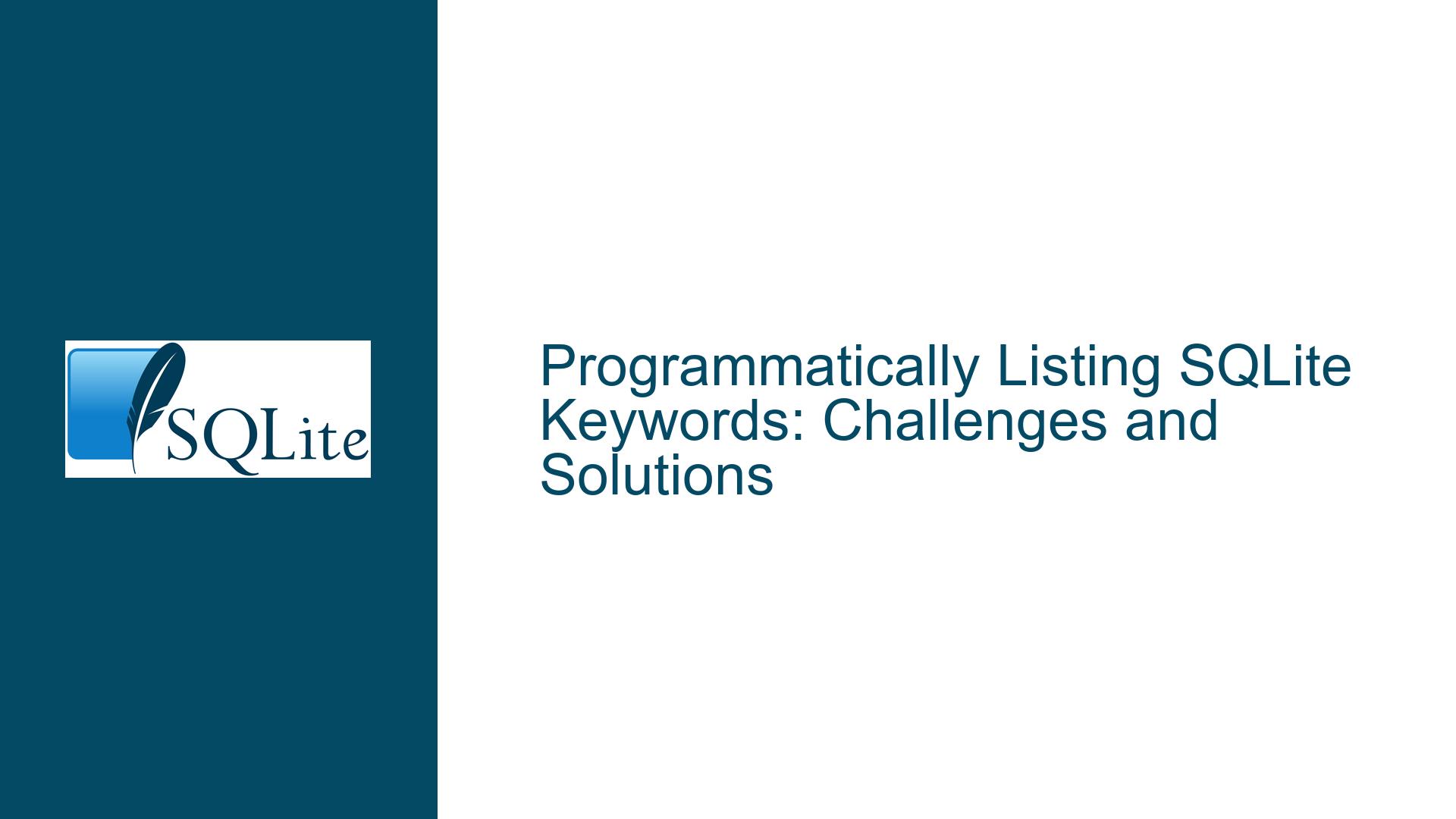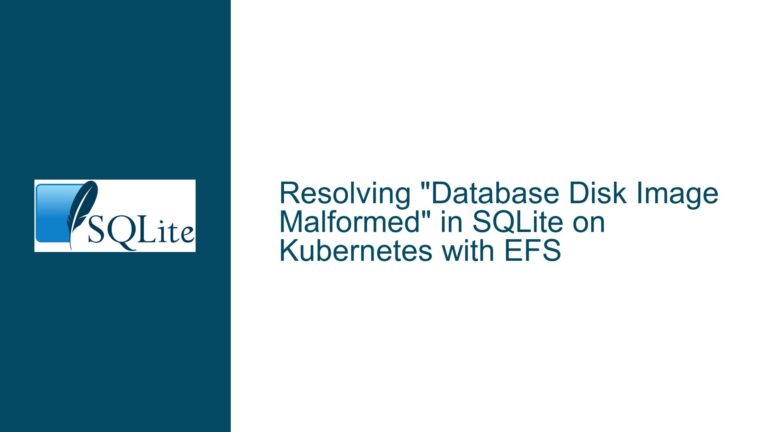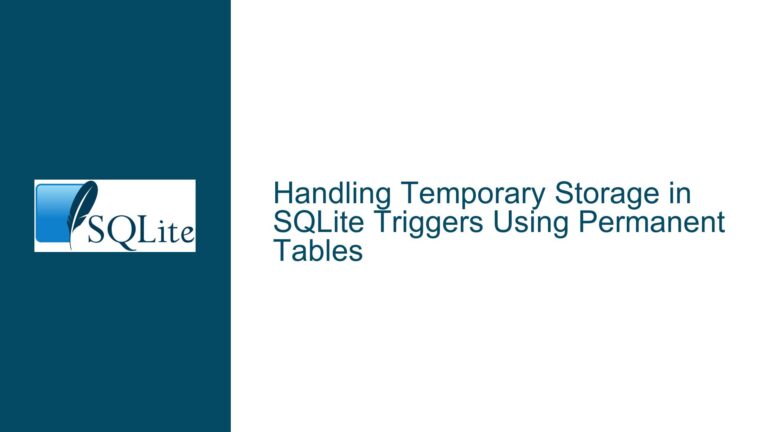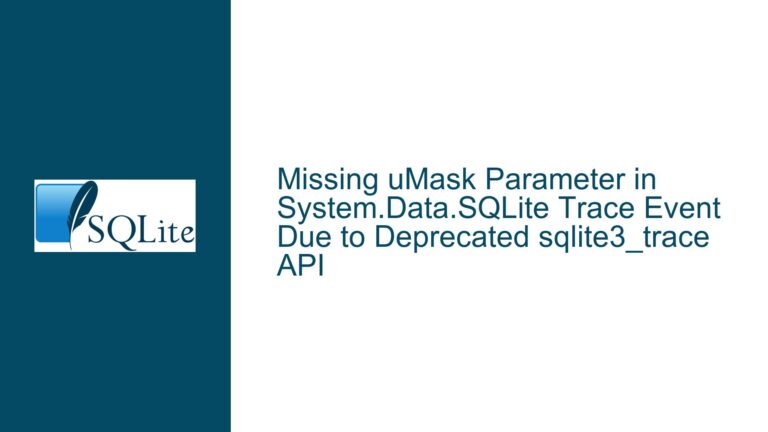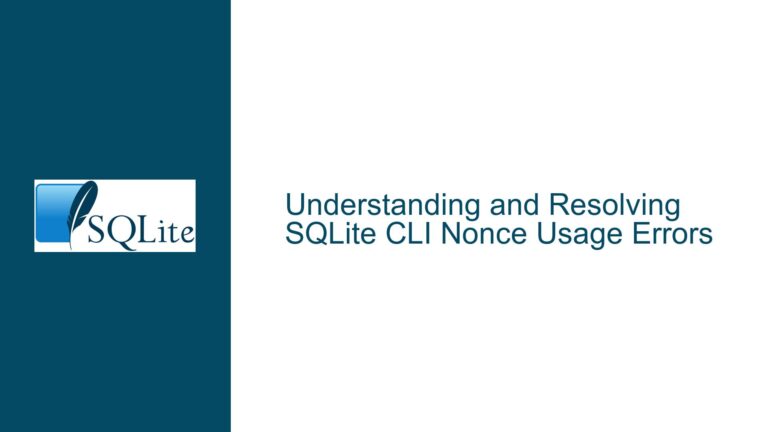Programmatically Listing SQLite Keywords: Challenges and Solutions
Understanding the Need for Programmatic SQLite Keyword Listing
The ability to programmatically list SQLite keywords is a niche but important requirement for developers working on database introspection, dynamic query generation, or educational tools. SQLite, being a lightweight and embedded database, does not natively provide an SQL-based mechanism to enumerate its reserved keywords. This limitation can pose challenges for developers who rely on such functionality for their applications.
The core issue revolves around the absence of a built-in SQL solution to retrieve SQLite keywords. While SQLite provides APIs like sqlite3_keyword_count() and sqlite3_keyword_name() for this purpose, these are not directly accessible through SQL queries. This gap necessitates alternative approaches, such as creating custom extensions or leveraging external libraries, to achieve the desired functionality.
Exploring the Limitations and Workarounds for SQLite Keyword Retrieval
The primary limitation in SQLite is the lack of a direct SQL interface to list keywords. Unlike functions, which can be enumerated using PRAGMA function_list, keywords do not have an equivalent mechanism. This design choice is likely due to SQLite’s focus on minimalism and performance, where non-essential features are excluded to keep the database lightweight.
However, SQLite does expose C APIs (sqlite3_keyword_count() and sqlite3_keyword_name()) that can be used to retrieve keyword information programmatically. These APIs are part of SQLite’s core library and are intended for use in native applications. For developers using higher-level languages or frameworks, such as those relying on System.Data.SQLite.DLL, accessing these APIs directly is not straightforward. This limitation necessitates creative workarounds, such as creating custom extensions or using platform-specific mechanisms like P/Invoke to bridge the gap.
Implementing a Custom SQLite Extension for Keyword Listing
One effective solution to the problem is the creation of a custom SQLite extension that exposes keyword retrieval functionality through SQL functions. The provided discussion includes a detailed example of such an extension, implemented in C. This extension introduces two new SQL functions: keyword_count() and keyword(N). The keyword_count() function returns the total number of SQLite keywords, while keyword(N) retrieves the Nth keyword based on a zero-based index.
The extension leverages SQLite’s C API to interact with the internal keyword list. The sqlite3_keyword_count() function is used to determine the total number of keywords, and sqlite3_keyword_name() retrieves the name of a specific keyword by its index. These functions are wrapped in SQL-callable functions using SQLite’s extension mechanism, making them accessible through SQL queries.
To use the extension, developers must compile it into a shared library (e.g., .so, .dylib, or .dll) and load it into their SQLite session using the .load command. Once loaded, the extension enables queries like the following to list all SQLite keywords:
SELECT keyword(value-1) AS kw
FROM generate_series(1, keyword_count())
ORDER BY kw ASC;
This approach provides a flexible and reusable solution for keyword retrieval, suitable for both CLI and programmatic use. However, it requires familiarity with C programming and SQLite’s extension API, which may be a barrier for some developers.
Addressing Future Compatibility and Integration Concerns
A key concern raised in the discussion is whether the custom extension will remain compatible with future versions of SQLite. Specifically, the questions focus on whether the extension will automatically pick up new keywords added in future releases and whether it could be integrated into SQLite’s official distribution as a PRAGMA or similar feature.
The extension’s reliance on SQLite’s internal APIs ensures that it will automatically reflect any changes to the keyword list in future versions. Since sqlite3_keyword_count() and sqlite3_keyword_name() are part of SQLite’s stable API, the extension will continue to function as long as these APIs remain unchanged. This makes the solution robust and future-proof.
As for integration into SQLite’s official distribution, the likelihood is low. SQLite’s development philosophy emphasizes minimalism and stability, and new features are added sparingly. While the extension could be submitted as a contribution, its inclusion would depend on the SQLite development team’s assessment of its utility and alignment with the project’s goals. In the meantime, developers can use the extension as a standalone solution.
Evaluating Alternative Approaches and Their Trade-offs
While the custom extension is a powerful solution, it is not the only approach to listing SQLite keywords. Alternative methods include:
Hardcoding the Keyword List: Developers could manually maintain a list of SQLite keywords in their application code. This approach is simple but prone to errors and requires updates whenever SQLite adds new keywords.
Using External Tools: Tools like
sqlite3CLI or third-party libraries might provide keyword listing functionality. However, these tools are often platform-specific or lack programmatic access.Parsing SQLite Documentation: SQLite’s documentation includes a list of reserved keywords. Developers could parse this documentation to extract the keyword list. This approach is fragile and depends on the documentation’s format and availability.
Each of these alternatives has trade-offs in terms of complexity, maintainability, and reliability. The custom extension strikes a balance by providing a reusable, future-proof solution that integrates seamlessly with SQLite.
Step-by-Step Guide to Building and Using the Custom Extension
For developers interested in implementing the custom extension, the following steps provide a detailed guide:
Set Up the Development Environment: Ensure that you have a C compiler (e.g., GCC or Clang) and SQLite’s source code available. Set the
SQDIRenvironment variable to point to the SQLite source directory.Create the Extension Source File: Save the provided C code into a file named
keywords.c.Compile the Extension:
- On Linux:
gcc -O2 -shared -I$SQDIR -fPIC -o keywords.so keywords.c - On macOS:
gcc -O2 -dynamiclib -fPIC -I$SQDIR -o keywords.dylib keywords.c - On Windows:
gcc -O2 -shared -I%SQDIR% -o keywords.dll keywords.corcl /Os -I%SQDIR% keywords.c -link -dll -out:keywords.dll
- On Linux:
Load the Extension in SQLite: Start an SQLite session and load the extension using the
.loadcommand. For example:.load ./keywordsQuery the Keyword List: Use the provided SQL query to list all keywords:
SELECT keyword(value-1) AS kw FROM generate_series(1, keyword_count()) ORDER BY kw ASC;Integrate into Applications: For programmatic use, ensure that the extension is loaded before executing keyword-related queries. This may involve modifying application startup code or using SQLite’s runtime loading mechanisms.
Conclusion: A Robust Solution for SQLite Keyword Retrieval
The custom SQLite extension presented in this guide provides a robust and future-proof solution for programmatically listing SQLite keywords. By leveraging SQLite’s internal APIs, the extension ensures compatibility with current and future versions of the database. While the implementation requires some familiarity with C programming and SQLite’s extension mechanism, the effort is justified by the flexibility and reliability of the resulting solution.
For developers seeking a simpler approach, alternatives like hardcoding the keyword list or using external tools may suffice. However, these methods come with significant trade-offs in terms of maintainability and accuracy. The custom extension strikes a balance by providing a reusable, platform-independent solution that integrates seamlessly with SQLite.
As SQLite continues to evolve, the extension’s reliance on stable APIs ensures that it will remain a valuable tool for developers. Whether used in CLI sessions or integrated into applications, the extension empowers developers to explore and utilize SQLite’s keyword list with confidence.
